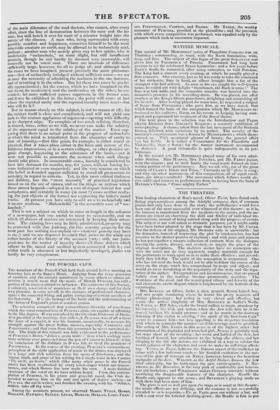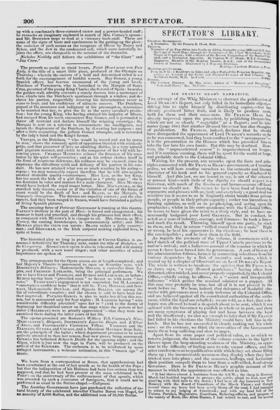TIIE THEATRES.
THE leading characters of Box's novel, Oliver Twist, have found such fitting representatives among the Adelphi company, that, if common justice had only been done to the story, the performance would have been one of the most successful ever witnessed at this theatre : as it is, the interest is transferred from the incidents to the actors, and the au- dience are intent on observing the skill and fidelity of individual im- personations, instead of being carried along with the progress of events. The subject is not well suited to dramatic purposes, yet it might easily have been better adapted to the stage than it has been by Mr. COYNE. For the defects of the original, Mr. DICKENS only is answerable : but the dramatist, instead of improving the plot by condeusation, has had recourse to the shorter process of excision ; and with paste and scissors he has put together a meagre collection of extracts from the dialogue, leaving the action, dresses, and scenery, to supply the place of the original descriptions. The skeleton scenes have no connexion one with the other, nor do they separately employ materials enough for the performers to work upon so as to make them effective ; and accord- ingly they fell flat. The spirit of the conception is evaporated. One who has not read the book would not be able to follow the course of the story on the stage, much less comprehend its scope and object ; and would gn away wondering at time popularity of the story and the repu- tation of the author. Exaggerations and inconsistencies, that are passed lightly over in the reading, become prominently manifest. The weakness of the good, and the unmitigated villany and ferocity of the bad characters, excite disgust, which is heightened by the horrors of the catastrophe.
Mrs. KEELEY, as Oliver, looks a nice, genteel, flaxen-haired boy, and sets people wondering where he learnt his pretty manners and choice phraseology : her acting is very clever anti effective, but wants the artless simplicity of Mrs. HONNER'S at Sadler's Wells. 0. SMITH, as mu syt., exalts the brutal ruffian to tragic grandeur by his intensity: his look and action, when the Jew tells him he is be- trayed, betoken his deadly purpose; and as he stands in the doorway listening if his victim is stirring, " the spirit. of the first-horn Cain" seems to animate him: not less appalling is the desperate resolution with which he commits the murder—as if his revenge must be gratified. The acting of Mrs. YATES in this scene is of the highest order : her personation of the degraded and wretched girl, Nancy, is painfully real, but stops short of the revolting: her scorn and hatred of the Jew, her loathing of lewself, her attachment to the being she abhors, and her clinging to the life she detests, are exhibited in a way to subdue the Immoral ugliness of the character, and even to make its sufferings affect- ing. YATES, as Fayin, lightens the hideous aspect of the tratlieker in crime with a few ludicrous touches : his fiendish exultation at the suc- cess of his plan of revenge on Nancy, however, betrays the heartless malignity of the Jew, W as the Artful Dodger, dresses the low thief admirably, but he burlesques the part extravagantly. F. MA- Tnrsw's, as Mr. Brownlow, is the very pink of comfortable and benevo- lent old bachelors ; and WILKINSON makes Grimwig tolerable without sacrificing the disagreeable features of the character. Bumble the Beadle only appears in one scene ; and BEvsnumiv's playing made us wish there had been more of him.
The piece is not so well put upon time stage as is usual at this theatre: flue scenic effects arc not striking, and the costume is not so carefully attended to as is requisite,—Eas gr. Fagin goes out without a hat, and with a coat over his tattered dressing-gown ; the Beadle is fain to put
up with a coachman's three-cornered castor and a pewter-headed staff ; he ransacks an imaginary cupboard in search of Mrs. Corney's spoons ; and Mr. Brownlow stops to read at a visionary book-stall. These arc some of the signs of haste and carelessness in the getting-up the piece: the omission of such scenes as the recapture of Oliver by Nancy and Sykes, and the Jew in the condemned cell, which more materially in- jures the effect, are chargeable to the account of the dramatist, Nicholas Nic/deby still follows the exhibitions of "the Giant" and "Jim Crow."



























 Previous page
Previous page